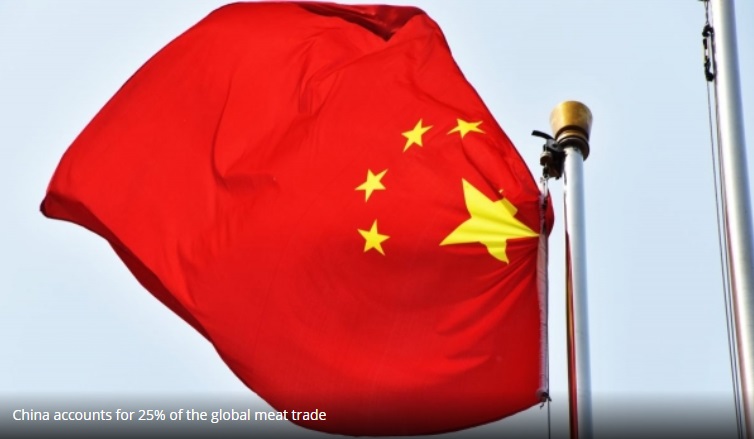China accounts for 25% of the global meat trade

The Chinese market has expanded rapidly in the last 10 years and the imports have gone even higher since ASF has affected the country. Nevertheless, the unique situation poses major risks for the exporters.
Posted on Sep 03 ,10:10

China is seen as a pillar for the global meat trade, with the country counting as the world’s largest destination for beef, sheepmeat, pork, poultry and offal, pulling in close to one-quarter of total meat traded on international markets, according to the latest Meat and Livestock Australia (MLA) analysis.
The situation is unique in the modern history of the world, with no other country representing such a big market for the global meat trade. “While China has always been a large animal protein market due to its sheer size (representing an estimated 46% of global pork consumption, 15% of poultry, 11% of beef and 33% of sheepmeat in 2018), its growing importance as an importer is evidenced across most meat proteins. This rise has been underpinned by environmental and resource constraints limiting production capacity and consumers shifting, as they become more affluent, from carbohydrate grain-based diets to protein-rich foods derived from animal products.
As highlighted below, China’s share of global beef imports increased from 4% to 23% between 2009 and the most recent 12-months of available data, while sheepmeat jumped from 10% to 36%. Pork imports have lifted from 12% to 26%, while offal has increased from 38% to 47% over the same period. China’s share of the global poultry trade has remained flat due to expanding domestic production”, said MLA Market Insights Manager, Tim Ryan.
However, even if China’s demand for animal protein has been critical to supporting global prices at a time of record meat production and trade, its importance in the global meat market can influence meat production in different parts of the world.
The ongoing trade war with the US has limited access for US pork in this market due to tariffs that are now up to 72%, while the recent diplomatic conflict with Canada has to lead to a halt in imports of Canadian pork in the last couple of months. That could cause monumental shifts in global meat flows and even changes in consumption habits around the world. As an example, Argentina, one of the beef exporting countries that benefit from the increased demand for meat in the Chinese market, is worried about the dependency on that market. “What happens if the Chinese market is getting cold? It would cause us deep damage. We are too focused on one country,”, warned Miguel Schiariti, president of the Argentinian Chamber of Meat Industry and Commerce (CICCRA). During the first seven months of 2019, Argentina exported 408,100 tonnes of beef. For H1, the volume exported was 225,726 tonnes, up by 47.4% compared to H1 2018. Of that total, 163,000 tonnes were shipped to China, or 72% of the total, with an interannual increase of 108.3%. It was followed by Chile (14,200 tons), Israel (11,900) and Germany (11,875).
Besides that, as Mr. Ryan mentions in his analysis “what happens in China and its trade relationship with the US will have a profound impact on the global market going forward. As much as Australian red meat has to gain from increased meat demand in the wake of ASF, there is more at stake if the Chinese economy were to slow down. Moreover, the risk of a broader global trade-induced slowdown, at a time of record meat production, remains very real and could hurt demand for premium Australian beef and sheepmeat”.
